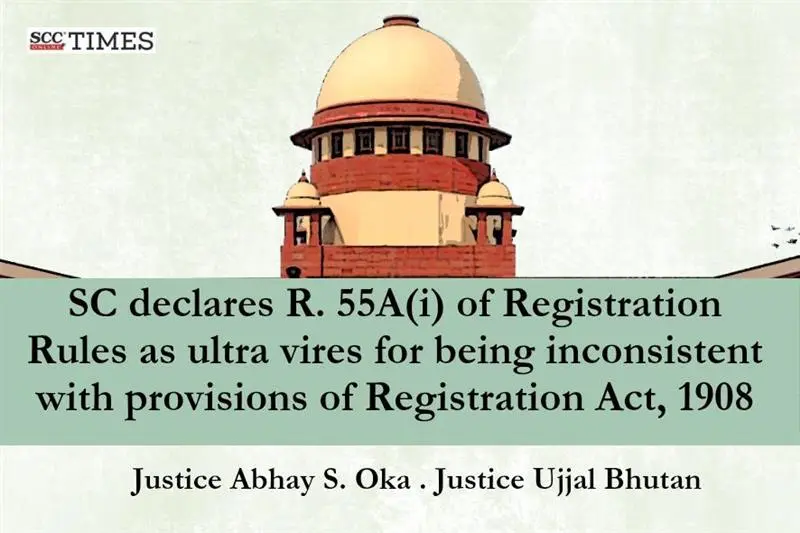Supreme Court: While considering the instant appeal which incorporated a challenge to the legality of Rule 55A(i) of the Registration Rules; the Division Bench of Abhay S. Oka* and Ujjal Bhuyan, JJ., declared the impugned Rule to be ultra-vires. The Court explained that under the scheme of the 1908 Act, it is not the function of the Sub-Registrar or Registering Authority to ascertain whether the vendor has title to the property which he is seeking to transfer. Once the registering authority is satisfied that the parties to the document are present before him and the parties admit execution thereof before him, subject to making procedural compliances as narrated above, the document must be registered. The execution and registration of a document have the effect of transferring only those rights, if any, that the executant possesses. If the executant has no right, title, or interest in the property, the registered document cannot effect any transfer.
Therefore, assuming that there is a power under Section 69 of the Registration Act, 1908 to frame the Rules, Rule 55A(i) is inconsistent with the provisions of the 1908 Act. Due to the inconsistency, Rule 55A(i) will have to be declared ultra vires the 1908 Act. The rulemaking power under Section 69 cannot be exercised to make a Rule that is inconsistent with the provisions of the 1908 Act.
Background and Legal Trajectory:
In September 2022, a sale deed was executed in favour of the appellant in respect of the property mentioned therein. The Sub-Registrar refused to register the sale deed. The appellant filed a writ petition to challenge the refusal. However, the writ petition was dismissed. Thereafter, the appellant preferred an appeal to the District Registrar against the Sub-Registrar’s order refusing to register the sale deed. The appeal was allowed and the District Registrar directed the Sub-Registrar to reconsider his decision. By a letter, the Sub-Registrar directed the appellant to resubmit the document along with proof of the vendor’s title to transfer the property. The appellant again submitted the sale deed for registration. However, by the order passed on the same day, registration was refused.
A writ petition was filed against the order of refusal before Madras High Court, which was rejected. A writ appeal was preferred against the rejection of the writ petition by the Single Judge, which was further dismissed by the impugned order. The impugned order held that under Rule 55A of the Registration Rules under the Registration Act, 1908 framed by the Government of Tamil Nadu, the Sub-Registrar was entitled to refuse the registration of the sale deed on the ground that the appellant’s vendor has not established his title and ownership.
The appellant challenged the impugned judgment and subsequently amended his plea to incorporate challenge to the vires of Rule 55A(i).
Submissions:
The appellant’s counsel submitted that the Sub-Registrar, who is empowered to register a document under the 1908 Act, is not empowered to go into the question of the title of the person executing the document for transferring the property. Section 69 does not empower the Inspector General to frame Rules providing power to refuse registration of a sale deed or transfer deed in the event the vendor has failed to prove his title. Moreover, the Rules can be framed which are consistent with the Act. In the 1908 Act, there is no provision to refuse registration on the ground that the vendor has not proved his title. Therefore, Rule 55(A)(i) is ultra vires the provision of the 1908 Act and therefore, Rule 55(A)(i) is invalid.
Advocate General for the State of Tamil Nadu appeared for the respondents and submitted that, the State is prepared to take steps for the registration of the sale deed. He submitted that the validity challenge in respect of Rule 55A(i) is pending before the Madras High Court, therefore, a validity challenge cannot be entertained in the instant appeal as the issue was raised for the first time in the SLP.
Court’s Assessment:
Perusing Rule 55A(i) of the Registration Rules, the Court pointed out that the Rule in substance mandates that when a document relating to an immovable property is presented for registration before a registering officer, the same shall not be registered unless the previous original deed by which the executant acquired the right over the subject property is produced and an encumbrance certificate obtained within ten days of the date of presentation. In the event of an encumbrance such as a mortgage, attachment, sale agreement, or lease agreement, the registering officer shall not register such a document if the time limit for filing a suit for specific performance has not lapsed or the appropriate authority has not granted a No Objection Certificate.
The Court also referred to Sections 22-A and 22-B incorporated by the State of Tamil Nadu in the 1908 Act.
The Court pointed out that in the instant case the registration was refused on the ground that the title of the vendor and the appellant was not established. On plain reading of Sections 22-A and 22-B, on the ground of failure to produce documents of title of the vendor, registration could not have been refused.
Perusing Section 69 of the 1908 Act, the Court stated that none of the clauses under Section 69 provides for framing Rules conferring power on the registering authority to refuse registration of a document of transfer. No provision under the 1908 Act confers power on any authority to refuse registration of a transfer document on the ground that the documents regarding the title of the vendor are not produced, or if his title is not established. Even Sections 22-A and 22-B, incorporated by way of State amendment, do not have such a provision.
Section 22-A is restricted to specific cases and Section 22-B enables the registering officer to refuse registration of a forged document. It also confers power on the registering officer to refuse registration of a document in respect of a transaction that is prohibited under either the laws of the State or the Central Government. If any property has been attached either permanently or provisionally by a competent authority under the Central Act or State Act, Section 22-B enjoins the registering officer to refuse registration of a document making a transfer. Sections 22-A and 22-B provide for mandatory refusal of registration of the documents covered by specific categories mentioned therein.
However, Rule 55-A empowers the registering officer to refuse registration unless the presenter produces the original deed by which the executant acquired rights over the subject property and an encumbrance certificate pertaining to the property, obtained within ten days from the date of presentation. If the original deed is not available due to its antiquity, the registration of the presented document will be refused unless the presenter produces a revenue record that evidences the executant’s right over the subject property. If the original deed is lost, the document cannot be registered unless a non-traceable certificate is issued by the police department along with an advertisement published in the local newspaper, giving notice of the loss of the previous original deed.
Therefore, Rule 55A of the Registration Rules provides that unless documents are produced to prove that the executant has a right in respect of the property subject matter of the instrument, the registration of the same shall be refused. Thus, if a sale deed is presented for registration, documents must be produced to demonstrate that the executant has acquired ownership of the property. “In a sense, power has been conferred on the registering officer to verify the title of the executant. Unless documents are produced evidencing title as required by Rule 55A(i), registration of the sale deed shall be refused”.
The registering officer is not concerned with the title held by the executant. He has no adjudicatory power to decide whether the executant has any title. Even if an executant executes a sale deed or a lease in respect of a land in respect of which he has no title, the registering officer cannot refuse to register the document if all the procedural compliances are made and the necessary stamp duty as well as registration charges/fee are paid.
With the afore-stated assessment, the Court declared Rule 55A(i) to be ultra-vires, set aside the impugned order of the High Court and permitted the appellant to lodge the sale deed for registration within a period of one month from date of the instant judgment. On procedural compliances being made, the concerned registering officer shall proceed to register the sale deed.
CASE DETAILS
|
Citation: Appellants : Respondents : |
Advocates who appeared in this case For Appellant(s): For Respondent(s): |
CORAM :








